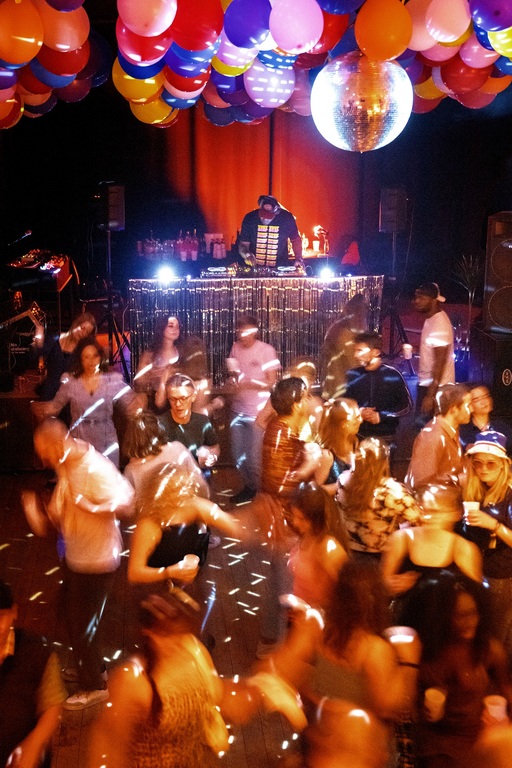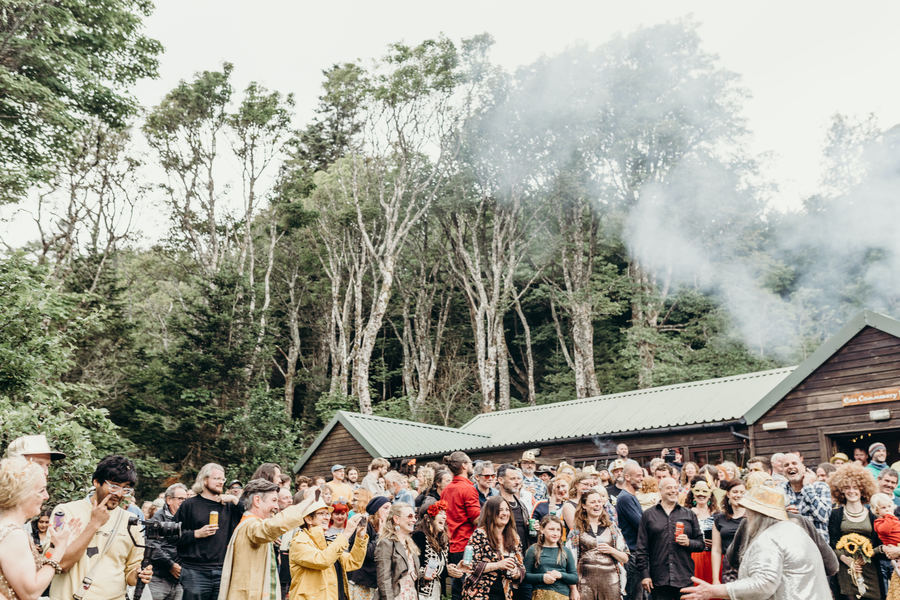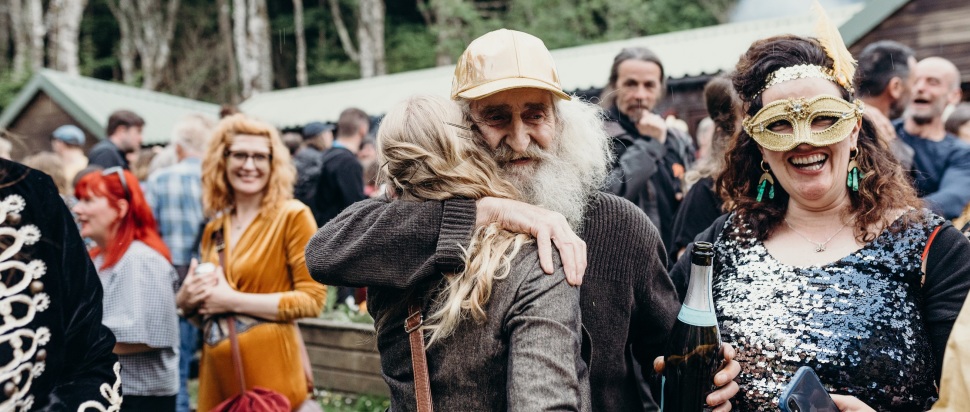Island Gatherings: Detour Discotheque and Lost Map
With musical island adventures afoot off the west coast, we catch up with Detour Discotheque organiser Jonny Ensall and Lost Map Records boss, and Eigg resident, Johnny Lynch to talk community, infrastructure and creativity
Something about site-specific music festivals calls to our collective imagination. There’s an almost primal pull to the seclusion, the epic connection between art and nature, the journey – it’s the same urge that drives every Bruce Springsteen song. So the sell-out success of Detour Discotheque on the Isle of Coll should come as no surprise, even three months out and with no version of the event ever having taken place in the UK yet.
The concept behind Detour Discotheque is simple: throw the world’s most remote disco once a year, every time somewhere new. Bring enough decorations to transform a small village hall into a 1970s New York nightclub, and a gang of exciting DJs and musicians (this year's lineup features Free Love and Auntie Flo, as well as an appearance from Coll's resident ceilidh band, who are undergoing a temporary cosmic rebrand). Last year, its first outing, took the disco to Þingeyri – a fishing village in the Westfjords of Iceland with a population of a couple hundred people, where an old bank had been converted into a co-working space in an attempt to combat depopulation. Jonny Ensall, the man behind Detour Discotheque, was covering it for Norwegian Airlines’ inflight magazine.
“I was invited to one of their local events, something called the Hjónaball or “couples’ dance”, and I was embraced, like literally embraced very warmly by the people at this event, who were really happy to see a relatively young outsider within their village.”
From there, a disco wasn’t much of a leap. “I was an outsider in this village in the middle of nowhere in Iceland, and yet I was made to feel part of this community. So even though it sounds like they're from totally different universes, there is something about the kind of communities that you find in these small, secluded places that is like the kind of communities that you develop around certain musical styles and types of event.”
So why Coll this year? A few reasons: Ensall knew he wanted to do something in Scotland from his three years living here. Coll itself holds the distinguished title of an International Dark Sky Community, which means it has shown “exceptional dedication to the preservation of the night sky.” It has mostly flat terrain, few streetlights, and an uninterrupted view of the stars (weather permitting), which invites a lean into cosmic disco for this year’s event, both sonically and visually.
Most importantly, though, Coll had the infrastructure in place to withstand its population doubling over one weekend: of course we're drawn to the odyssey of the event, but we can’t just arrive, soak up the island’s resources and leave, having made life impossible for its residents. Coll has a hotel, a B&B, and a bunkhouse, plus specific camping spots. An Cridhe, the venue, was built in 2012, and is strikingly modern for a Scottish village hall, with clean-cut, spacious high ceilings and excellent facilities.

Detour Discotheque in Iceland, 2022. Credit: Haukur Sigurdsson
Managing island resources is a necessary strength for Lost Map Records, who are based two isles over on Eigg and regularly run events up there. Celebrating their tenth anniversary this year, the staple of their calendar year is a small festival consisting of just two stages, a bar and some food (at such low capacity it’s not legally big enough to be considered a festival; ‘gathering’ is more appropriate). In years gone by periods of drought meant water shortages (the island has no public water supply; its residents get their water from springs), and while that’s not currently a threat, their approach is still a responsible one. Unlike Detour Discotheque, where accommodation is the deciding influence on event capacity, Lost Map’s micro-festival is camping-only. So their ticket limit is set by how many people can actually reach the island.
The CalMac ferry from Mallaig to Eigg runs for an hour and a half around Skye's jagged underside. But it has a capacity of 200 and even in summer only runs four times a week – there is only one ferry festival-goers can feasibly take to arrive on time. Pictish Trail’s Johnny Lynch, who runs Lost Map Records, sees this as part of the event’s appeal. They used to charter a private ferry to do a few trips back and forth, but logistical changes meant it no longer made sense; in parallel, they scaled back ticket numbers out of a desire to protect the island’s infrastructure. It’s now harder for ticket-holders to get to the island, but the close-knit feel that makes the event so fun is further concentrated for the fortunate few who do make it.
“[Skye, Mull and Iona] have a much more regular ferry service and so it'd be trickier to kind of keep a handle on. Eigg has not got as much of a ferry service and it is a bit trickier to get to – that kind of regulates the numbers.”
The target audience for this type of event is clearly the sort of person who relishes the journey, the challenge of it. You might expect that category of festival-goer to inherently respect the fine balance of an island ecosystem, naturally and infrastructurally speaking, but when you run an event that generates excitement like this, you can’t take for granted that people won’t turn up unannounced: “Folk should definitely book in advance if they want to ever make a trip up [...] My absolute nightmare is that 5,000 people try to descend on Mallaig to get over.”

Lost MAp's Family Gathering on the Isle of Eigg in 2022. Photo: Solen Collet
In more remote locations, even on this petite scale, an event lives and dies on the support of the community. For Ensall, diving into Coll as an outsider, this meant working his way around the island, talking to local businesses. What he uncovered was a strong appetite for something just like what he was pitching: the Coll Hotel offered space for a pre-disco party on the Thursday night; the board of An Cridhe were so helpful that Ensall now considers it a co-production with the venue.
Lynch ran the first of Lost Map’s Eigg events when he was still a mainlander 13 years ago – visiting his partner who had just moved back home, he was struck by how special it was and wanted to set something up there right away. You get a sense that his DIY approach encouraged the community to rally around a shared project: locals volunteered at the bar, erected the marquee, built a stage out of leftover pallets. It even seemed to have the power to mend metaphorical bridges: “There were a few folk on the island who... weren't exactly best pals with one another who suddenly were working side by side... getting on like a house on fire."
He adds that Eigg folk are a particularly gregarious bunch. “I think there was just a bit of excitement about it happening. [...] It's always the islanders, you know, they're the ones who will stay out the latest and party the hardest." He continues: "Where I was living before in the East Neuk of Fife, locals didn't tend to get involved at all in any of the events that we put on. In fact they were kind of like, ‘Oh, do you live here?’”
The appeal of events like these is obvious from Lost Map’s ticket sales patterns. Their events in Edinburgh and London have the same exciting programming but have never matched the speed with which the island events sell out. It’s understandable. The feeling of an adventure is a near-universal part of the island tourist experience. But there is perhaps a need for mainlanders to change their perception of these destinations, to better understand the lives of the people whose homes they invade over summer. Lynch points to the fact that only locals can bring cars on the Eigg ferry as a huge help – they’re unlikely to face the blockages and influx of campervans that larger hotspots struggle with. He seems happy with the balance being struck on his home – in his own words tourism is what the island is.
The journey necessarily shapes your mindset when you arrive. As an outsider, and based on his own experience, Ensall says: "Part of the magic is that everybody has taken the same journey to get there... So by the time you arrive you feel a connection with people." Some resent the constant depictions of the islands as mystical, remote spots for self-reflection – they are, after all, modern homes with modern people residing in them. But for Lynch this is still very much the point, even after 13 years. “I think they are exotic places... Just the vibrancy of all the colours up here... It seems like a weird computer game more than it does reality. Creative ideas just seem to come to life a lot easier.”
Find more about Detour Discotheque and Lost Map Records at detourdisco.com and lostmap.com
